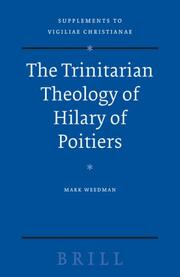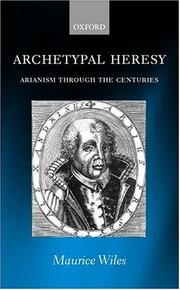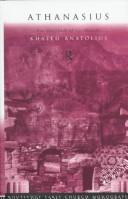| Listing 1 - 6 of 6 |
Sort by
|

ISBN: 128193674X 9786611936747 9047431278 9789047431275 9789004162242 9004162240 Year: 2007 Publisher: Leiden ; Boston : Brill,
Abstract | Keywords | Export | Availability | Bookmark
 Loading...
Loading...Choose an application
- Reference Manager
- EndNote
- RefWorks (Direct export to RefWorks)
When Hilary of Poitiers was exiled from his native Poitiers in Gaul to Cappadocia, his entire theological sensibility changed. The Latin bishop, schooled in the tradition of Tertullian and Novatian, became a full-throated participant in the Trinitarian controversies of his time. This book offers a new reading of Hilary’s Trinitarian theology that takes into account the historical context of Hilary’s thought. It first examines this context and the course of Hilary’s engagement with his Homoian opponents. It then turns to the key themes of Hilary’s theology as he worked them out in that context. The result is a work that not only helps clarify Hilary’s theology, but that offers new insight into the Trinitarian controversies as a whole.
Trinity --- Homoousian controversy. --- History of doctrines --- Hilary,

ISBN: 1281989304 9786611989309 0191520594 9780191520594 0199245916 9780199245918 0198269277 9780198269274 9780191600814 0191600814 Year: 1996 Publisher: Oxford : New York : Clarendon Press ; Oxford University Press,
Abstract | Keywords | Export | Availability | Bookmark
 Loading...
Loading...Choose an application
- Reference Manager
- EndNote
- RefWorks (Direct export to RefWorks)
Arianism --- Antitrinitarianism --- Christian heresies --- Homoousian controversy --- History. --- History --- Christian theology --- Arius
Book
ISBN: 0813211697 9780813211695 Year: 2001 Publisher: Washington, D.C. : Catholic University of America Press,
Abstract | Keywords | Export | Availability | Bookmark
 Loading...
Loading...Choose an application
- Reference Manager
- EndNote
- RefWorks (Direct export to RefWorks)
Arianism. --- Trinity. --- Theology --- Antitrinitarianism --- Christian heresies --- Homoousian controversy --- Theology, Doctrinal --- Triads (Philosophy) --- Appropriation (Christian theology) --- God (Christianity) --- Godhead (Mormon theology) --- Holy Spirit --- Trinities --- Tritheism --- History
Book
ISSN: 05534003 ISBN: 9783110251548 9783110251555 3110251558 1283400073 9786613400079 311025154X Year: 2011 Volume: 66 Publisher: Berlin ; New York : De Gruyter,
Abstract | Keywords | Export | Availability | Bookmark
 Loading...
Loading...Choose an application
- Reference Manager
- EndNote
- RefWorks (Direct export to RefWorks)
Während des sog. zweiten Reichs der Burgunder an der Rhône (etwa 443 bis zur Eroberung durch die Franken 534) entstand eine selbständige burgundische, "arianisch"-homöische Reichskirche. Das führte zu Auseinandersetzungen, aber auch zu einem intensiven theologischen Austausch mit der überwiegend nizänischen gallo-römischen Bevölkerung. Besonders das Werk des Bischofs Avitus von Vienne, seine reichhaltige Korrespondenz, theologischen Fragmente und Homilien geben einen unmittelbaren Einblick in die Zeit. Die Monographie führt in die Geschichte des Reichs der Burgunder ein und bietet erstmals ausgewählte Briefe und Fragmente des Avitus mit deutscher Übersetzung und Kommentierung. Im Mittelpunkt steht der theologische Austausch mit dem burgundischen König Gundobad. Die Briefe und Fragmente weisen auf kirchenorganisatorische Probleme hin - ob z.B. Kirchengebäude der "Arianer" genutzt werden können - sowie auf Religionsgespräche und theologische Diskussionen, besonders über den heiligen Geist (filioque). Es wird erstmals genauer beschrieben, was "arianisch" zu jener Zeit in Burgund bedeutete im Unterschied zu den gleichzeitigen theologischen Debatten im Reich der Vandalen.
Avitus, --- Burgundy (Kingdom) --- Homoousian controversy --- Church history --- 273.4 --- 27 <44> --- Arianisme --- Kerkgeschiedenis--Frankrijk --- 273.4 Arianisme --- Avitus, Alcimus Ecdicius, --- Avit, --- Alcimus Ecdicius Avitus, --- Bourgogne (Kingdom) --- Arles (Kingdom) --- Church history. --- Arianism --- Avitus ep. Viennensis --- Avitus, - Saint, Bishop of Vienne --- Burgundy (Kingdom) - Church history --- Homoousian controversy - Burgundy (Kingdom) --- Arian Controversy. --- Avitus of Vienne. --- Burgundian. --- Church History. --- Migration Period.
Book
ISBN: 1641891017 1641891025 1641891009 Year: 2021 Publisher: Leeds : Arc Humanities Press,
Abstract | Keywords | Export | Availability | Bookmark
 Loading...
Loading...Choose an application
- Reference Manager
- EndNote
- RefWorks (Direct export to RefWorks)
This book surveys Arianism, a Christian creed of tremendous historical importance that once served as the faith of Roman emperors and the barbarians on the frontiers alike, while it simultaneously advances existing scholarship by integrating the approaches of history and theology with those drawn from the cognitive science of religion. This paradigm shift allows us to understand the initial support for the Arian creed and its eventual rejection by Roman emperors; to recognize the nature of intuitions of divinity amongst Germanic peoples before their conversion; to discern the way in which these were translated into Christian belief; and to differentiate the beliefs of Arius from those called 'Arians' by their opponents.
Arianism --- Church history --- History. --- Apostolic Church --- Christianity --- Church, Apostolic --- Early Christianity --- Early church --- Primitive and early church --- Primitive Christianity --- Fathers of the church --- Great Apostasy (Mormon doctrine) --- Antitrinitarianism --- Christian heresies --- Homoousian controversy --- History --- Arianism. --- Arius. --- Christianity. --- Church History. --- Ecclesiastical History. --- Homoianism. --- Late Antiquity.

ISBN: 1134264771 0203008901 9780203008904 9781134264735 9781134264773 9781134264780 9780415186377 9780415351744 390676799X 0203272498 0415186374 Year: 2004 Volume: v. 733 Publisher: Hoboken : Taylor and Francis,
Abstract | Keywords | Export | Availability | Bookmark
 Loading...
Loading...Choose an application
- Reference Manager
- EndNote
- RefWorks (Direct export to RefWorks)
In this volume, Khaled Anatolios presents a comprehensive study of Saint Athanasius, one of the most influential figures in the development of Christian doctrine. He analyzes the coherence of Athanasius' theology by relating the various aspects of his doctrine - God, creation, theological anthropology, Christology and redemption, and the life of grace - to a pervasive emphasis on the radical distinction, and simultaneous relation, between God and world. Athanasius: The Coherence of his Thought provides a systematic account of the overall inner logic of the Athanasian vision. It shows
Theology, Doctrinal --- Church history --- Arianism. --- Religion. --- Antitrinitarianism --- Christian heresies --- Homoousian controversy --- Christian doctrines --- Christianity --- Doctrinal theology --- Doctrines, Christian --- Dogmatic theology --- Fundamental theology --- Systematic theology --- Theology, Dogmatic --- Theology, Systematic --- Theology --- History --- Doctrines --- Athanasius, --- Afanasiĭ, --- Афанасий, --- Aḟanasīĭ Velikīĭ, --- Atanasio, --- Atanazy, --- Atanazy Wielki, --- Athanase, --- Athanasios, --- Athanāsiyūs, --- Athnāsiyūs, --- Bābā Athanāsiyūs Baṭriyark al-Iskandarīyah, --- أثناسيوس، --- بابا اثناسيوس بطريرك الإسكندرية --- Atanasie cel Mare, --- Pseudo-Athanasius --- Athanasius. --- Theology. --- Religion --- Philosophy & Religion --- Atanasije Aleksandrijski, --- Athanasios Alexandreias, --- Athanasius, - Saint, Patriarch of Alexandria, - -373
| Listing 1 - 6 of 6 |
Sort by
|

 Search
Search Feedback
Feedback About UniCat
About UniCat  Help
Help News
News